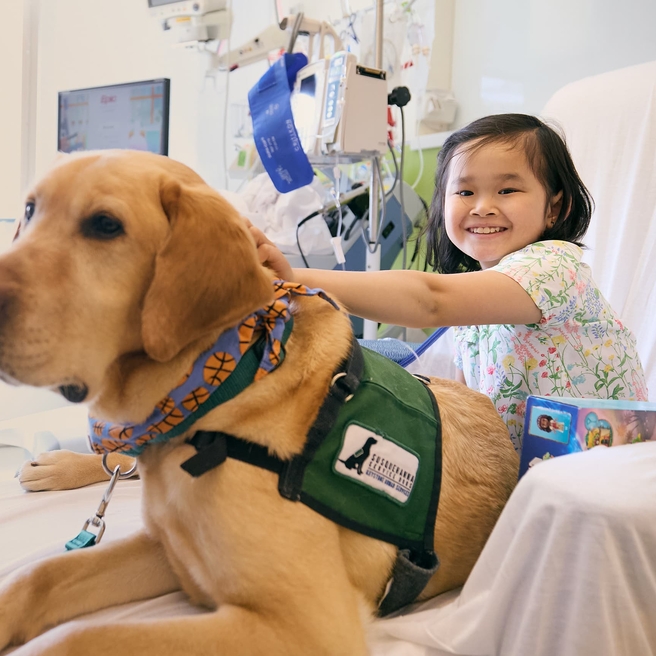
A baby recently delivered at Children’s Hospital of Philadelphia had several birth differences, and the cause was discovered at lightning speed with a targeted treatment immediately available. It sounds like science fiction, but it was possible because of Baby Eagle, a paradigm-shifting program for critically ill newborns and infants at CHOP. The program makes rapid genomic testing freely available for families with newborns and aims to expand and accelerate diagnostics for genetic conditions.
Deploying rTAG
Genome sequencing maps a person’s entire genetic makeup to identify differences from the average human genome. With improving technology and decreasing costs, CHOP is committed to implementing the next evolution: rapid genomic sequencing (rGS).
Baby Eagle deploys a new test called rapid targeted analysis of the genome (rTAG) developed in the Division of Genomic Diagnostic. The test begins by sequencing the entire genome, followed by a targeted analysis of approximately 3,000 genes clinically relevant in the newborn period.
“CHOP’s unique strength is to bring this technology to bedside safely and thoughtfully,” explains Surabhi Mulchandani, MS, AVP and Vice Chair of Administration in the Department of Pathology and Laboratory Medicine.
Since July 2023, Baby Eagle has delivered rGS to more than 500 infants. Prior to the program, just 1% of critically ill babies received rGS testing. Today, that percentage has increased nearly twentyfold.
Delivering answers
Because the rTAG test analyzes thousands of genes, many families have received diagnoses that enabled them to pursue proactive treatments. For example, one infant tested positive for a gene that increases the likelihood of retinal detachment, which enabled his parents to schedule eye surgery immediately — before he experienced vision loss.
Even in the most difficult cases, when no treatments will be effective, rTAG informs parents so they can pursue palliative care to spend meaningful time with their children, avoid potentially invasive tests or treatments, and achieve some closure by having an explanation for why their baby was sick.
In some instances, results have even prompted testing of other family members. For example, an infant was admitted with congenital diaphragmatic hernia, a birth difference where the diaphragm does not fully form. After rapid testing identified a gene that put the child at risk of cardiac arrhythmia — in which the heart beats too quickly, too slowly or irregularly — the same genetic change was found in the mother, who opted to have a pacemaker installed to prevent a cardiac arrest.
“Baby Eagle has revolutionized the care that we provide to critically ill newborns,” says K. Taylor Wild, MD, attending physician in the Divisions of Neonatology and Human Genetics. “We are so grateful to the Roberts Collaborative for making it possible for us to improve access to genetic testing for our sickest infants.”
In 2016, the Roberts family made a gift to establish the Roberts Collaborative for Genetics and Individualized Medicine at CHOP to promote holistic genetics care and research in diagnostics, clinical management, patient support and counseling, resident and medical student training, informatics, and therapeutics. Baby Eagle is one of the many pathbreaking initiatives supported by the Roberts Collaborative.
To date, more than 30% of infants enrolled in the program have received a positive result, providing families with important health information and an understanding of the risks of recurrence.
Dramatically reducing wait times
Rapid targeted analysis of the genome dramatically accelerates the delivery of genomic sequencing. Prior to Baby Eagle, families might have waited as long as 90 days for genetic test results. Baby Eagle has achieved a median result time of nine days, with most positive results verbally delivered to families within six days and negative results within four days.
“It used to take a long time to analyze genetic data, and waiting months for a genetic diagnosis is not really an option,” explains Mulchandani. “Baby Eagle flipped the script. We can get answers within a matter of days and use that data to personalize treatment.”
Rapid testing has the power to reshape how CHOP practices genetics. The ability to secure results within a week provides doctors with vital data when and where they need it most — while patients are still in the hospital. If patients have a treatable disorder, treatment can begin immediately. Genetic results, positive or negative, enable clinicians to avoid unnecessary tests and treatments and spare families extended, costly hospital stays.
Aiming for new heights
Having surpassed their goals for 2024, the Baby Eagle team has no intention of lowering their sights. The program has already been made available to infants throughout CHOP, and in 2025 leaders aim to expand the program to other network newborn/infant intensive care units.
“Expanding access is vitally important. Genetic testing is expensive and rarely reimbursed by insurance,” explains Dr. Wild. “Baby Eagle delivers rapid genomic sequencing to our sickest patients at no cost to families. Getting results quickly will spare children unnecessary or invasive tests and provide answers during a hospitalization, hopefully reducing stress and uncertainty for families.”
To learn how you can support genomics at CHOP, contact Michael Byun at byunm@chop.edu.
Featured in this article
Experts
Specialties & Programs
A baby recently delivered at Children’s Hospital of Philadelphia had several birth differences, and the cause was discovered at lightning speed with a targeted treatment immediately available. It sounds like science fiction, but it was possible because of Baby Eagle, a paradigm-shifting program for critically ill newborns and infants at CHOP. The program makes rapid genomic testing freely available for families with newborns and aims to expand and accelerate diagnostics for genetic conditions.
Deploying rTAG
Genome sequencing maps a person’s entire genetic makeup to identify differences from the average human genome. With improving technology and decreasing costs, CHOP is committed to implementing the next evolution: rapid genomic sequencing (rGS).
Baby Eagle deploys a new test called rapid targeted analysis of the genome (rTAG) developed in the Division of Genomic Diagnostic. The test begins by sequencing the entire genome, followed by a targeted analysis of approximately 3,000 genes clinically relevant in the newborn period.
“CHOP’s unique strength is to bring this technology to bedside safely and thoughtfully,” explains Surabhi Mulchandani, MS, AVP and Vice Chair of Administration in the Department of Pathology and Laboratory Medicine.
Since July 2023, Baby Eagle has delivered rGS to more than 500 infants. Prior to the program, just 1% of critically ill babies received rGS testing. Today, that percentage has increased nearly twentyfold.
Delivering answers
Because the rTAG test analyzes thousands of genes, many families have received diagnoses that enabled them to pursue proactive treatments. For example, one infant tested positive for a gene that increases the likelihood of retinal detachment, which enabled his parents to schedule eye surgery immediately — before he experienced vision loss.
Even in the most difficult cases, when no treatments will be effective, rTAG informs parents so they can pursue palliative care to spend meaningful time with their children, avoid potentially invasive tests or treatments, and achieve some closure by having an explanation for why their baby was sick.
In some instances, results have even prompted testing of other family members. For example, an infant was admitted with congenital diaphragmatic hernia, a birth difference where the diaphragm does not fully form. After rapid testing identified a gene that put the child at risk of cardiac arrhythmia — in which the heart beats too quickly, too slowly or irregularly — the same genetic change was found in the mother, who opted to have a pacemaker installed to prevent a cardiac arrest.
“Baby Eagle has revolutionized the care that we provide to critically ill newborns,” says K. Taylor Wild, MD, attending physician in the Divisions of Neonatology and Human Genetics. “We are so grateful to the Roberts Collaborative for making it possible for us to improve access to genetic testing for our sickest infants.”
In 2016, the Roberts family made a gift to establish the Roberts Collaborative for Genetics and Individualized Medicine at CHOP to promote holistic genetics care and research in diagnostics, clinical management, patient support and counseling, resident and medical student training, informatics, and therapeutics. Baby Eagle is one of the many pathbreaking initiatives supported by the Roberts Collaborative.
To date, more than 30% of infants enrolled in the program have received a positive result, providing families with important health information and an understanding of the risks of recurrence.
Dramatically reducing wait times
Rapid targeted analysis of the genome dramatically accelerates the delivery of genomic sequencing. Prior to Baby Eagle, families might have waited as long as 90 days for genetic test results. Baby Eagle has achieved a median result time of nine days, with most positive results verbally delivered to families within six days and negative results within four days.
“It used to take a long time to analyze genetic data, and waiting months for a genetic diagnosis is not really an option,” explains Mulchandani. “Baby Eagle flipped the script. We can get answers within a matter of days and use that data to personalize treatment.”
Rapid testing has the power to reshape how CHOP practices genetics. The ability to secure results within a week provides doctors with vital data when and where they need it most — while patients are still in the hospital. If patients have a treatable disorder, treatment can begin immediately. Genetic results, positive or negative, enable clinicians to avoid unnecessary tests and treatments and spare families extended, costly hospital stays.
Aiming for new heights
Having surpassed their goals for 2024, the Baby Eagle team has no intention of lowering their sights. The program has already been made available to infants throughout CHOP, and in 2025 leaders aim to expand the program to other network newborn/infant intensive care units.
“Expanding access is vitally important. Genetic testing is expensive and rarely reimbursed by insurance,” explains Dr. Wild. “Baby Eagle delivers rapid genomic sequencing to our sickest patients at no cost to families. Getting results quickly will spare children unnecessary or invasive tests and provide answers during a hospitalization, hopefully reducing stress and uncertainty for families.”
To learn how you can support genomics at CHOP, contact Michael Byun at byunm@chop.edu.
Recommended reading
All in one place

Genetic testing revealed that Audrey had a rare condition called Beckwith-Wiedemann syndrome. With so many different areas of the body potentially affected, a child needs to be seen by multiple specialists, and CHOP is just the place to help. Donor support helps make it possible.
A day in the life of a facility dog

As a specially trained dog, Dilly helps patients cope with stress and can motivate them during therapy.
Drawing from the Community

A unique program at CHOP trains residents of Philadelphia to become phlebotomists. It benefits participants, CHOP and patient families.
Contact us
Division of Genomic Diagnostics